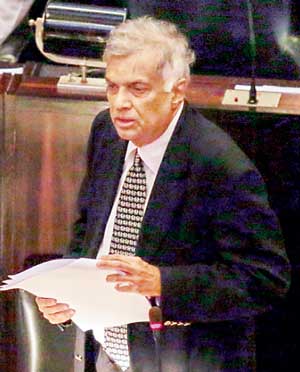Monday Feb 16, 2026
Monday Feb 16, 2026
Tuesday, 15 December 2015 01:02 - - {{hitsCtrl.values.hits}}
By Ashwin Hemmathagama
Facing down perhaps the biggest challenge to Budget 2016 Prime Minister Ranil Wickremesinghe yesterday offered an olive branch of sorts to trade unions that included a salary increase and concessions on industry related charges.
Wickremesinghe delivering a special statement to parliament that included a slew of promises after discussions with trade unions over the weekend informed that his Government would take steps to include the Rs.10,000 increment of public employees to their basic salary in three stages with the first starting in January with Rs.2,500.
Several amendments to the Budget proposals were also announced that centred on tax relief with more promised in the future. These  included reduction of the vehicle emission tax to Rs.1,500 as an interim measure and to reduce the revenue license fee increase to 15% from the initial 25% which was announced in the Budget speech.
included reduction of the vehicle emission tax to Rs.1,500 as an interim measure and to reduce the revenue license fee increase to 15% from the initial 25% which was announced in the Budget speech.
Wickremesinghe also reiterated his previous pledge in parliament to keep the Employees Provident Fund (EPF) and Employees Trust Fund (ETF) as separate entities under the Central Bank.
Talking extensively on pensions, the Prime Minister noted the Government had never renegade on pledges to pay pension to Government servants and would not do so in the future. He dwelt extensively on the expenses taken on by successive Governments to fund State sector pensions and criticised the previous Government under former President Mahinda Rajapaksa for expanding the public sector without reserving sufficient funds to pay pensions of new recruits.
“In 1963 the elderly in Sri Lanka was only 5.4% of the population. But by 2031 this will increase to 17.8% and by 2050 it will climb to 27.7%. Parallel to this longevity has also increased and by 2050 the average lifespan will increase to 81. In the 1960’s the Government had to pay pension only for five years but that has increased to about 15 years now and will grow to 20 years within the next three decades. In 2011 Rs.99, 961m was spent on pensions and that will increase to Rs.4 trillion by 2050,” the prime minister told lawmakers.
Drawing from examples around the world the prime minister pledged to continue payment of pensions for public servants. He also noted there could be procedural changes made to the way pensions are allocated to new recruits to the public sector but insisted there would be no cause for worry as any decisions would be taken transparently after discussions with trade union representatives. He also said fresh investigations would commence to look into how retirement funds may have been mismanaged by the former Government.
He also stated the Government would take measures to allocate funds to finance pensions of the large number of people recruited to the public sector during the past ten years as the former Government had largely neglected to do so. He also noted that unions have the power to voice their opinions in an open manner, which was not possible before January.
“The Government will not allow banks to be adversely affected by leasing activities being removed from them. This is another assurance we gave to banking unions that had discussions with us.”